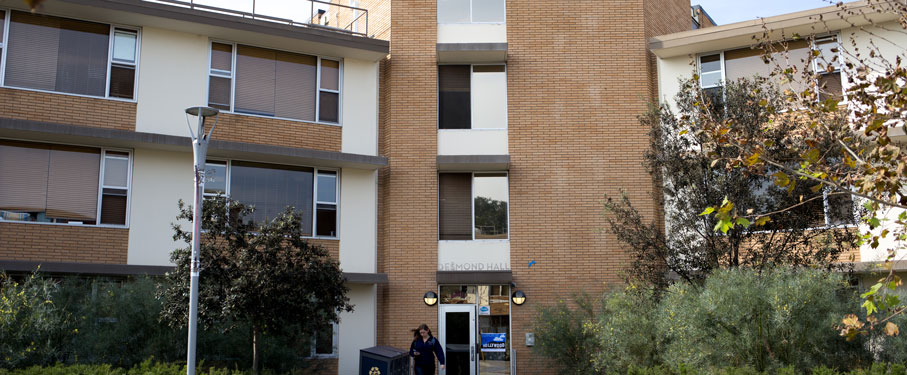Every college student has a dorm horror story, from leaky ceilings to mysterious stains. But because of increasing global temperatures due to climate change, LMU’s notoriously stuffy dorms aren’t just uncomfortable: they’re becoming dangerous.
According to NASA1, this summer was recorded as the earth’s hottest on record, but even on the tail end of Los Angeles’ 39 day heatwave2, most Loyola Marymount University students found no respite from the heat and humidity. As of September 2023, 78.9% of LMU’s student housing remains without air conditioning, which government bodies like the Centers for Disease Control and Prevention say is the most effective way to prevent heat-related illness and death.3 Even as Los Angeles emergency rooms have seen almost 4,000 heat-related illnesses and deaths, LMU continues to put its student body at risk by operating 15 dorms, apartments, or houses without air conditioning.4
Extreme heat is just as dangerous as other natural disasters and weather events like hurricanes or tornadoes. The County of Los Angeles Department of Public Health warns that with climate change, heatwaves will only increase in severity: “In LA County, hotter, longer heat waves caused by climate change are one of the major threats to the health and wellbeing of our communities,” reads the Department of Public Health website. “All across Los Angeles, we’re feeling the effects of climate change, like more very hot days and heat waves later in the summer. Scientists predict that climate change will continue to cause even more extreme heat in the future.”5
According to the Centers for Disease Control and Prevention, or the CDC, extreme heat is particularly dangerous for vulnerable populations, such as athletes and outdoor workers, infants and children, and the elderly. The CDC explicitly directs Americans in search of relief from extreme heat to “stay in air-conditioned buildings as much as you can. Air-conditioning is the number one way to protect yourself against heat-related illness and death.” The organization further emphasizes that it is unsafe to “rely on a fan as your main cooling device during an extreme heat event,” as it is insufficient protection.6
Furthermore, increased global temperatures are especially harmful to students. Not only have schools across the country begun to close for “heat days,” but the effects of heat on the human body present particular obstacles to learning.7 Studies show that test scores fall8 with increased temperatures, cognitive function and focus decline, and sleep is impaired – a relevant danger for most LMU residents who sleep through hot nights without air conditioning.9
“It really sucks having to live with no AC,” said LMU senior Morgan Shay, who lives in Leavey 4. “It’s almost unacceptable at this point that the majority of housing spaces on campus are without AC. Living in California with temperatures in the 90s and only having a little fan is not gonna cool down a space.” LMU graduate Sara Andelin, class of 2023, shared similar sentiments. “I lived in a dorm with no AC during my freshman year,” she said. “To keep cool I had to have 2 fans going, one big one for the whole room and one smaller one that could be aimed at me.” She also recalled nights that were so hot she slept on top of her bedding. “If you want my opinion, I think AC is so essential here in LA not only because of how hot it gets, but also because of how long our hot weather lasts, usually extending past summer and well into fall.”
LMU’s administration has acknowledged the importance of air conditioning during extreme heat. During an August 27th Heat Advisory10 in Los Angeles County, LMU’s Student Housing Office emailed a notice to residents reminding students about air-conditioned common spaces on campus. “In an effort to help you find some relief and comfort when temperatures rise, we are writing to make sure you are aware of the following air-conditioned locations here on the LMU campus,” the notice said.
Among the suggested locations were Burns Rec Center, the LMU library, and The Loft, for students 21 and older. The Student Housing Office also assured students that extreme heat at LMU is an anomaly: “Even though our location on the bluff creates more mild weather days with a nice ocean breeze, we do understand that it can get warm at times in the buildings.” Two days after this notice was sent, Los Angeles County issued another Heat Advisory on the 29th.
As a consequence of climate change, the last eight years have been the hottest ever recorded on Earth.11 As emergency rooms are overwhelmed each summer by victims of heat exhaustion, heatstroke, and even burns,12 scientists and city planners know that air conditioning is not a panacea. To reduce urban heat, cities need holistic solutions like reflective pavement and added green cover.13 Nevertheless, air conditioning remains the most effective solution to the physical dangers of extreme heat – so much so that the Los Angeles Department of Water and Power now offers financial assistance for families to install air conditioning in their homes, even as LMU students largely go without.14
Campus Safety, staff contacts on LMU’s Heat Illness Prevention page, LMU Housing, did not accept requests for comment.






